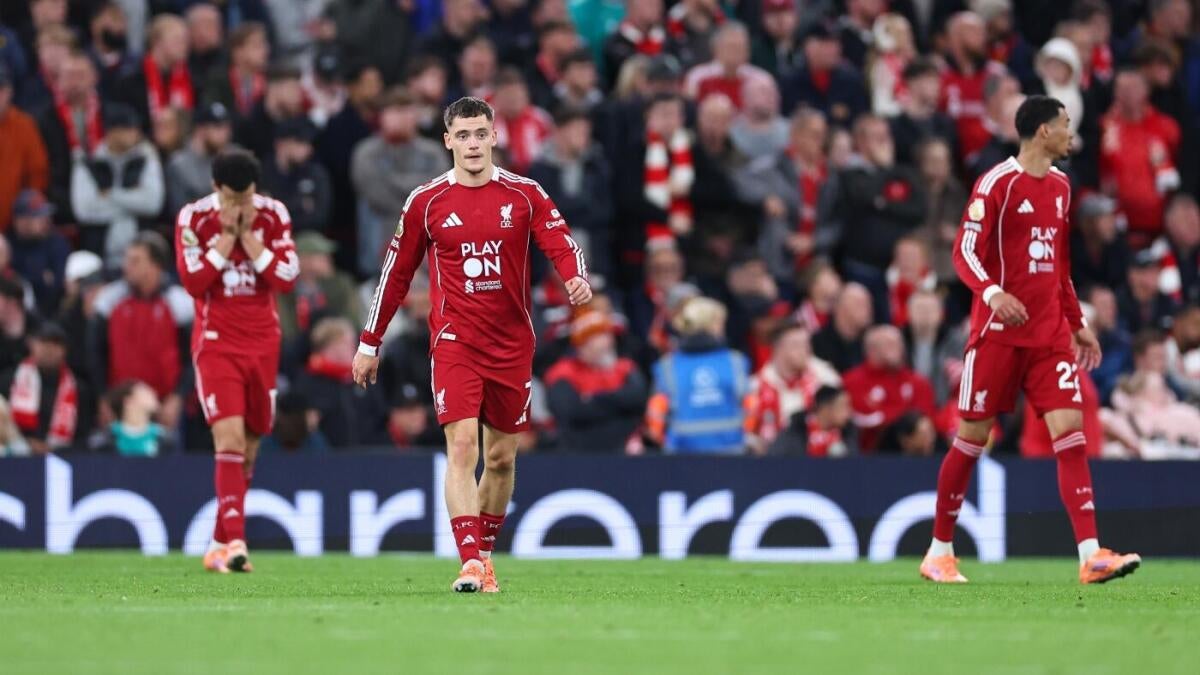**Liverpool vs Manchester United: A Classic Rivalry Rekindled Amid Turbulence**
A fixture between Liverpool and Manchester United is always one of the most anticipated events in English football. The historic rivalry between these two clubs transcends mere points or table positions; it’s about pride, legacy, and often, chaos. On Sunday, Anfield hosted the latest chapter of this storied contest, and while the match produced moments of drama, it also highlighted ongoing struggles—particularly for Liverpool, whose recent form is becoming a cause for concern.
**A Dramatic Start and a Tense Pursuit**
The match began with a shock for the home crowd. Barely two minutes into the game, Manchester United’s Bryan Mbeumo stunned Anfield with an early goal. This capitalized on Liverpool’s sluggish start and set the tone for nearly 80 minutes of relentless pressure from the hosts, who desperately sought an equalizer.
Liverpool’s dominance in possession and attacking statistics was clear. Over the course of the match, they controlled nearly 60% of the ball, took 18 shots (compared to United’s 11), and boasted an expected goals (xG) tally of 2.28 to United’s 0.92. Despite these numbers, Liverpool’s inability to convert chances into goals proved costly. Their quest for parity was only fulfilled in the 78th minute when Cody Gakpo finally found the back of the net, sending the home fans into a frenzy and seemingly setting up a dramatic finale.
But the euphoria was short-lived. Just six minutes later, Manchester United’s Harry Maguire struck from a set piece, restoring United’s lead and ultimately sealing a 2-1 victory. This win was significant for United: it marked their first triumph at Anfield in a decade and their first back-to-back Premier League wins under the stewardship of manager Rubin Amorim.
**Liverpool’s Imbalance: A Growing Concern**
Despite the enthralling finish, the overall quality of the contest was less impressive than the scoreline might suggest. The match reaffirmed existing concerns about Liverpool’s current approach and form. Under new manager Arne Slot, Liverpool’s play has become increasingly unbalanced—an issue that’s beginning to have tangible consequences in terms of results.
The Reds’ attacking output cannot be faulted. With a wealth of offensive talent at his disposal, Slot has ensured Liverpool are a constant threat going forward. Yet, this focus on attack has left glaring vulnerabilities elsewhere, especially in defense. Against United, Liverpool were repeatedly exposed—first by Mbeumo’s early goal, then by Maguire’s decisive header. Both goals highlighted a lack of defensive organization, particularly when facing set pieces.
This defensive fragility isn’t a new problem, but it’s now more damaging than ever. Liverpool’s “all-out-attack” philosophy, while entertaining, is leaving them susceptible at the back. The result is a team capable of creating chaos in the opposition’s box but equally prone to conceding at crucial moments—a dangerous combination that has now led to four consecutive defeats.
**Attacking Talent, Missed Chances**
It would be unfair to say Liverpool’s attackers aren’t pulling their weight, but there are signs of struggle. Cody Gakpo, who has been in fine form recently, did score the equalizer but was also guilty of a crucial miss after United regained the lead. Alexander Isak, another key forward, managed only two shots, largely neutralized by Maguire’s commanding defensive display.
Perhaps most worrying for Liverpool fans is the form of Mohamed Salah. The Egyptian forward, once the team’s most lethal weapon, looked off his best yet again. Despite taking three shots, Salah fluffed a key opportunity and has appeared increasingly out of sorts—raising questions about whether age and accumulated fatigue are catching up with him.
This lack of clinical finishing is symptomatic of a broader malaise. Liverpool’s wastefulness in front of goal has become a recurring theme, and their inefficiency is now costing them vital points. In their last four games—all defeats—they have scored just three goals while conceding seven, a stark reversal from the attacking juggernaut they appeared to be after a summer of heavy investment.
**Defensive Vulnerabilities Come Home to Roost**
It’s not just the missed chances up front that are hurting Liverpool. Their defensive deficiencies are now a glaring weakness that opponents are increasingly exploiting. Both of United’s goals were avoidable from Liverpool’s perspective:

